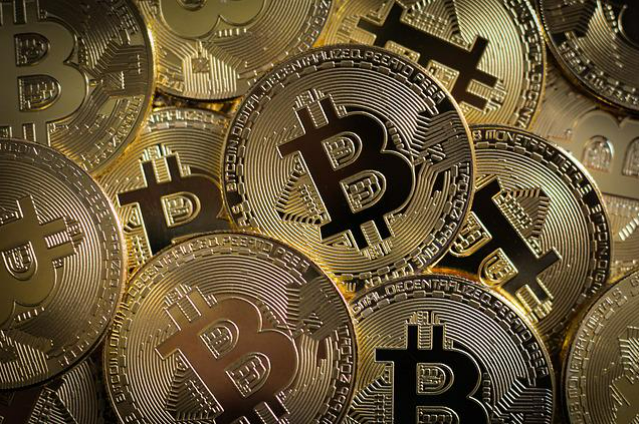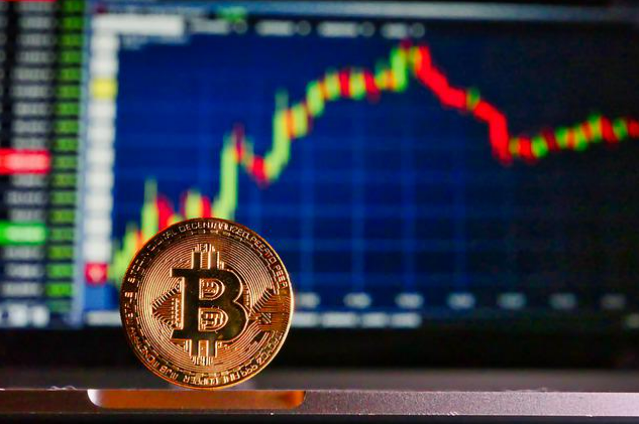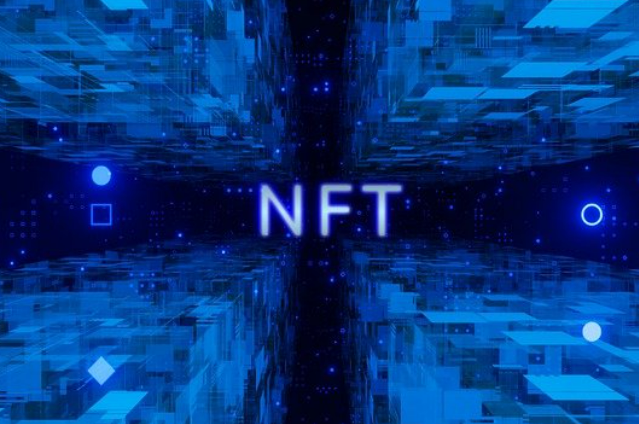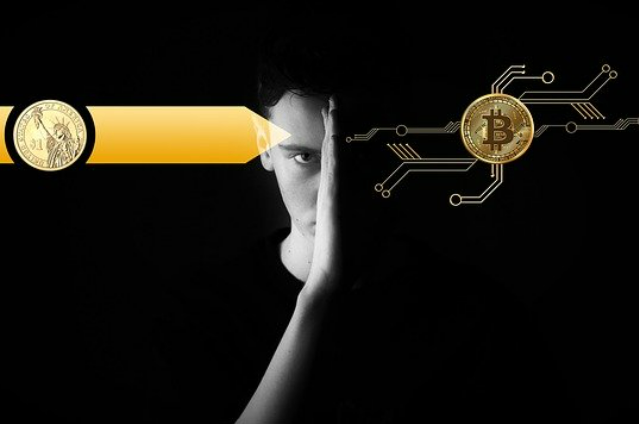
So before we dive deep into the world of cryptocurrency and blockchain, here is a little reminder that this article is only for educational and information purposes. So do not make any financial decisions based on what you read. Do your own research before investing. That’s it, let's dig in!
Bitcoin -
The first cryptocurrency
The story of Bitcoin began in the year 2011 when Satoshi Nakamoto invented a new technology that promised to change the world’s financial system. Even though it is doubtful if Satoshi Nakamoto is a person or a group of people, the technology that he/they presented to the world was of immense value and importance.
So let's talk about Bitcoin. Bitcoin uses a virtual data storing mechanism named blockchain. As the name suggests, it is a chain of blocks that contain data. But it is more complex and mind-boggling than it sounds. The data storing blocks are arranged and linked with each other in such a way that once the data is stored, it cannot be tampered with or manipulated.
Apart from this, Bitcoin stresses being decentralized, which means that there is no central authority or body that has the monopoly on making decisions, instead, decisions are made by a large group of people agreeing on a certain topic and following a pre-fixed mechanism. But what is so special about it?
By being decentralized, Bitcoin avoids entrusting the faith of the people in the hands of a few selected individuals, who at any time, can choose to make decisions for the purpose of making personal gains. Also, as there is no central authority, there is no single point of failure. This means that the failure of the whole network is not dependent upon the mistake of an individual.
The fudged up financial system of the world?
The world is run by banks. There is no denying the fact that banks and governments have an absurd amount of authority when it comes to money and other financial aspects. But have you ever questioned the working of banks and their influence in the world? Probably no. This is down to the fact that they have been around for a long time and there are backed by the government, the king of everyone. But let’s analyse how banks and the government have been fooling us for a long, very long time.
Let's focus on banks first. Banks offer very minimal interest rates that fail to beat even the standard inflation of 5-6% annually. So you are essentially losing money. And not only that, they charge high-interest rates on loans, mortgages and credit card dues. Apart from this, they use the money we deposit to earn huge profits while giving us a minor fraction of it. It is also to be noted that banks are not transparent with their workings as well.
Now let's talk about the government. Focusing only on currency and avoiding all other controversial topics, the government’s workings are very fishy. One such example of the government and banks' failure was the 2007-2008 Financial crisis. But now, the danger is even more. Previously US Dollars were backed by gold in the reserves, meaning that for every dollar issued, there was a certain amount of gold in the vault. Then due to the scarcity of Gold, every dollar was backed by silver. But now, many economists and financial analysts suspect that the government is printing currency out of thin air, meaning that the newly minted currency notes are not backed by gold or silver anymore. So basically we are valuing dollars because the government is saying so, and nothing else.
But this issue is not limited to the USA. Most currencies of the world are backed by US Dollars. This means that if the suspected mismanagement of currency is true, it will lead to a loss of value of US Dollars, which in turn will lead to the loss of value of all those currencies that are backed by it. We may be looking at another financial crisis again due to the failure of the government and the banks.
Fun Fact: 80% of the total supply of dollars ever was printed in the last 2 years (22 months).
Why is Bitcoin the pillar of the new financial system of the world?

Bitcoin is a cryptocurrency that aims at decentralizing the financial system of the world. This means that the finances of the entire world or nation will not be dependent on a single body of power. It will not have a single point of failure, unlike the government, which will lead to a more stable and reliable monetary environment. But how will this actually happen?
Firstly let's talk about the value. We often hear about inflation and depreciation of the currency which is mainly down to the printing of money on a large scale as discussed earlier. But that will never be the case for bitcoin. You see, bitcoin has a limited supply of tokens, meaning that eventually, a time will come when no new bitcoins can be mined. As a result, the value of Bitcoin will appreciate, hence beating inflation and depreciation of the currency. But apart from this, the powerlessness of not being able to print money at your own convenience will impact the workings of the financial, social and governmental system and they will be more focused on changing their policies, rather than printing their way out of it.
Secondly, decentralization. This is the foundation of Bitcoin. Bitcoin is a decentralized currency, meaning that it is not in the domain of being controlled solely by anyone, but rather, it works with the contribution and involvement of many people who contribute to the ecosystem through mining or acting as nodes for transaction verifications and other workings. As the environment of Bitcoin involves a huge number of validators, it is more secure. And because of being decentralized, its environment is subjected to change only when a majority of people in the ecosystem are in its favour.
But why will people value it?
Bitcoin is not a vague piece of paper like a currency that holds value just because we believe it holds value. Bitcoin is a technology, a concept, a new approach to identifying currency. Its blockchain is next to impossible to tamper with and stores the data of every transaction made on the network while maintaining the anonymity and privacy of the parties involved. As it is neutral to nations, it does not charge its users differently for international transactions. Bitcoin is valued because it provides value to society and to the financial ecosystem of the world.
But Bitcoin brought with it more than a concept, it brought with it the technology that was set to revolutionize the world of technology, corporates, finances and almost each and every aspect of the world. The two words, decentralization and blockchain were the foundation of what was to come next.
The Beginning of the revolution
After Bitcoin, there came a crypto project in 2015, by a 21-year-old Russian-Canadian, Vitalik Buterin, named Ethereum. Ethereum is a decentralized blockchain-based cryptocurrency that aims at creating a decentralized net. But the internet as we know is already decentralized, isn't it?
Well, no. The internet is actually owned by some private companies like Facebook, Instagram, Netflix, Google and others. The internet that we know today is not at all an open space where we can go virtually and do anything we feel like. Our opinions are censored by the companies if they feel that it is not right, even though they should not be the ones who should be able to make such decisions. And the content that we upload or the virtual things that we own on the internet are often not owned by us. It is actually owned by the company whose platform we are using to express ourselves.
But with Ethereum, we are finding that there can be platforms that are not running according to the will of an organization. These platforms give their users the liberty to do what they wish without the fear of censorship and irrational restrictions. Basically, after creating the platform, the platform is not run by the founder, rather, it is run by the users and for the users. Hence, on this platform, you can own anything digitally and create anything digitally, and it will be under your ownership and not of the platform. These kinds of platforms are mainly known as decentralized applications or DApps.

Other than this, Ethereum bought with it another revolutionary application of blockchain technology, the NFT. NFTs are digital assets that can be owned by only one individual at a time and which will imply that he/she is the owner of that piece of NFT. NFTs can be anything ranging from music, videos, and pictures to pieces of code, text, a ticket, digital art, etc… NFT has given digital creators the liberty to monetize and own art and work without the need for censorship and copyright. All of this is done through the application of blockchain technology and hence, it is impossible to tamper with.
Another important feature of Ethereum is its consensus model named smart contract. Smart contracts are executed themselves once the required conditions are met or the actions are carried out. They are basically pieces of code and because of this, their execution and working are trustless, meaning that as it does not involve any manipulative elements like humans, there is no reason to doubt their impartiality. Smart contracts have reduced middlemen and human interventions in decision makings, hence making the process more concise, compact and fault-proof.
Realizing the true potential
As the days are passing by, we are witnessing some true revolution in the world because of blockchain technology. Slowly we are realizing the need of decentralizing some overly centralized industries and areas of work, and fortunately enough, we are being able to achieve so. From insurance to finance, from gaming to the world of art, every sector is getting effected by blockchain technology.
With cryptocurrencies like Chainlink, we have got something named oracle. An oracle collects real-world data in real-time and provides them to the blockchain that requires them, because blockchain is not like the internet, so it can only access the data stored in its blocks. With the help of Oracles, we are able to create decentralized insurance services, price trackers of stocks (so that non-residents of one country can invest in their companies with no complications), weather forecasting and many other things.
Also, with the help of blockchain technology, there has been a rise in the world of decentralized financial systems. These are called Defi. A Defi is a decentralized financial instrument that makes daily financial activities like investments, savings, fixed deposits, trading and much more decentralized. The major benefit of Defi is that apart from changing existing financial workings, they are creating mechanisms that enable the introduction of new financial opportunities.
And finally, DAOs. A DAO is a Decentralized Autonomous Organization that runs on codes and often has its own token or currency that it uses for governance, growth and development. Basically, a DAO is a modern-day alternative to a company. Like a company, a DAO can have employees and it can have certain goals and objectives which determine its line and area of work and also the necessary procedures required to be carried out. But unlike a company, there is no bureaucracy, corruption or red-tapism in DAO as it is a non-living body running on code. Essentially, a DAO can also be a peaceful and fun community where people of similar beliefs can come together to achieve certain not-so-serious goals.
The shady part

With great power, comes great responsibilities.
This quote by Uncle Ben from Spiderman may well be the definition of the crypto world. Crypto has provided us with endless possibilities and enormous power to do whatever we feel like. With its help, we have chosen to dream big and achieve it. But there comes a point of time when every technology faces a stage of aggressive monetization urges and profit-greed. And that stage is now.
Crypto, being a relatively new technology, is not known to most people. Thus, scammers pitch some unrealistic expectations and promises to potential investors, making them believe that this new technology is some sort of magic. And as there is a lot of FOMO (Fear Of Missing Out) among the people regarding crypto, they don’t do much research and put their money in a “soon to be 100x” project. This increases the price of the coin drastically in the short run and the investors feel that it's a win for them. But this ultimately results in a rug pull and the developers dump their massive coin holdings and run away with the money. And that my friends, is the classic pump and dump crypto scam.
Another crypto scam that people are often caught in is the NFT scam. So NFTs are digital art that is usually unique in nature and often is associated with some exclusive perks. Many NFTs have gone 100x in a month’s span and as a result, have gained a lot of traction among people. Because of being a form of art, it is often very hard to tell whether a particular NFT is a scam or not. Hence, scammers create random NFTs with no intrinsic value and sell them to investors as the “Next Mona Lisa”. Again, at the end of the day, it's a win for the scammers.
Final Verdict
Crypto is very new to the world and people are just starting to realize its true potential. It is a technology that surely has the potential to revolutionize the way we see the world, analyse a situation, solve a problem and even our way of living. Blockchain by itself is just a data storing unit, but with its integration with other technologies like artificial intelligence, the internet and others, we can come up with an even better something.
But we must realize that everything revolutionary is a two-edged sword. It changes something flawed and provides us with something better. But this new better may not be the best for us. So at the end of the day, it is our responsibility to not go with the flow but to analyse before taking any step. Like this, we may not be always right, but will surely be on the safer side. And regarding crypto, learn before trying to earn.
